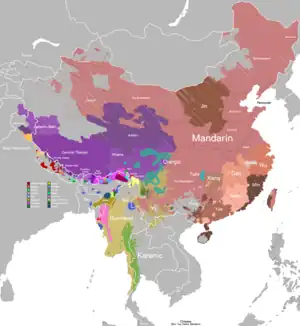Weitou dialect
The Weitou dialect (simplified Chinese: 围头话; traditional Chinese: 圍頭話; lit. 'walled (village) language'; Jyutping: Waitau Waa) is a dialect of Yue Chinese. It forms part of the Guan–Bao (莞寶片; 莞宝片, Dongguan–Bao'an) branch of Yuehai. It is spoken by older generations in Luohu and Futian districts in Shenzhen, and by those in the New Territories, Hong Kong.
| Weitou dialect | |
|---|---|
| 圍頭話 | |
| Native to | Guangdong |
| Language codes | |
| ISO 639-3 | – |
| Glottolog | None |
| Weitou dialect | |||||||||||
|---|---|---|---|---|---|---|---|---|---|---|---|
| Traditional Chinese | 圍頭話 | ||||||||||
| Simplified Chinese | 围头话 | ||||||||||
| |||||||||||
The Weitou dialect can be heard in Hong Kong TV dramas and movies, and is usually used to depict characters who come from walled villages. For example, in the 1992 movie Now You See Love, Now You Don't, the chief character, played by Chow Yun-fat who himself grew up in Lamma Island, consistently speaks the Weitou dialect.
In a more general sense, Weitouhua can refer to any variety of Chinese spoken in the villages of Hong Kong, including Hakka and rural Yue dialects. In contrast, most Hong Kong residents speak standard Cantonese, while most Shenzhen residents speak Mandarin.
Phonology
Zhang & Zhuang (2003:21-4) records the phonological systems of three varieties of the Weitou dialect spoken in Hong Kong. Following is Fan Tin's (蕃田), San Tin (in IPA).
| p | pʰ | b | f | w |
| t | tʰ | d | l | |
| tʃ | tʃʰ | ʃ | j | |
| k | kʰ | ɡ | h | |
| kʷ | kʷʰ | ɡʷ |
| a | œ | ɔ | ɛ | i | u | y | ||
| ai | ɐi | ɵy | ||||||
| au | ɐu | eu | ||||||
| am | ɐm | em | m | |||||
| æŋ | ɐŋ | œŋ | ɛŋ | yœŋ | ŋ | |||
| ɵŋ | oŋ | eŋ | ||||||
| ap | ɐp | ep | ||||||
| æk | ɐk | œk | ɛk | yœk | ||||
| ɵk | ok | ek |
There are four tone contours, when the "entering tones" (stopped syllables) are ignored:
| tone name | contour | description |
| Yin Ping | ˨˧ (23) or ˥ (55) | low rising or high |
| Yang Ping | ˨˩ (21) | low |
| Shang | ˧˥ (35) | high rising |
| Qu | ˧ (33) | mid |
References
- (in Chinese) Zhang Shaungqing 張雙慶 & Zhuang Chusheng 莊初昇 (2003). Xianggang xinjie fangyan (香港新界方言 "The Dialects of the New Territories, Hong Kong"). Hong Kong: Commercial Press. ISBN 962-07-1682-5.
External links
- (in Chinese) 黄建全,《深圳平湖围头话音系分析》,2005。
- (in Chinese) 《深圳方言分布》,深圳新闻网。
